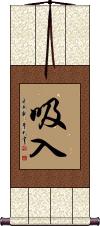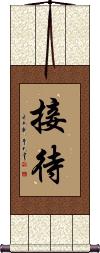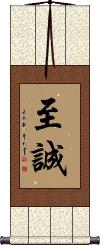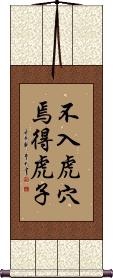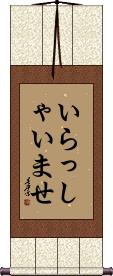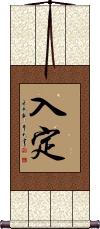Many custom options...
And formats...

Enter in Chinese / Japanese...
Buy an Enter calligraphy wall scroll here!
Personalize your custom “Enter” project by clicking the button next to your favorite “Enter” title below...
1. Inhale
2. Kensho Jobutsu - Enlightenment - Path to Buddha
3. Settai
5. How can you catch tiger cubs without entering the lair of the tiger?
6. Welcome
Inhale
吸入 is a Chinese, Japanese, and old Korean word that means inhale, inhalation, or to breathe in.
吸 by itself can mean to inhale or suck in.
入 means to enter (in this case, the body), so it clarifies that this is the true inhalation of air into the body.
If you need a reminder to breathe (slow down and take a deep breath), this may be the word you want hanging on your wall.
Kensho Jobutsu - Enlightenment - Path to Buddha
見性成仏 or Kenshō Jōbutsu is the initial enlightenment that leads to self-awareness, becoming Buddha, and the path to enter Nirvana.
Kenshō Jōbutsu is a complex concept in Japanese Buddhism. 見性成仏 is probably better translated as “Seeing one’s nature and becoming a Buddha.”
See Also: Buddhism | Enlightenment | Initial Enlightenment
Settai
This is the Japanese surname Settai.
This also is a word that means to receive (a visitor), to admit (allow somebody to enter), reception, welcome, to receive and treat, to entertain, or wait upon.
Sincerity and Devotion
至誠 is the idea that you enter into something with the utmost sincerity and fidelity. Ideas such as devotion, honesty, and “one's true heart” are also contained in this word.
至誠 is a universal word as the Chinese, Japanese Kanji, and Korean Hanja are all identical.
How can you catch tiger cubs without entering the lair of the tiger?
Nothing ventured, nothing gained
While perhaps no longer politically correct, this Chinese proverb is a reminder that you must take risks if you want rewards.
不入虎穴焉得虎子 is similar to the English proverb, “Nothing ventured, nothing gained.”
The literal word order of the Chinese is, “If (you) don't enter the tiger's lair/cave, how can (you) get/obtain tiger cubs?.”
Welcome
いらっしゃいませ is the Japanese greeting that you'll hear just about every time you enter a sushi bar, restaurant, or shop in Japan.
This calligraphy would be appropriate to hang by the entry door of your business or shop.
Note: Because this title is entirely Japanese Hiragana, it should be written by a Japanese calligrapher.
Zen Contemplation
入定 is a title that can be defined as Zen contemplation in Japanese or sitting quietly in (Buddhist) meditation in Chinese. It also carries a similar meaning in Korean Hanja. Therefore, this is a universal term for meditation in the context of Buddhism throughout the Orient.
Can also be translated as “Meditatively equipoised” or “enter into meditation by stilling the karmic activities of deed, speech, and thought.”
The original Sanskrit word is samapanna. In Tibetan: snyoms par zhugs pa.
These search terms might be related to Enter:
One Key Opens One Lock
Perseverance is the Key
Pierce
The Key to Immortality is First Living a Life Worth Remembering
Not the results for enter that you were looking for?
Below are some entries from our dictionary that may match your enter search...
| Characters If shown, 2nd row is Simp. Chinese |
Pronunciation Romanization |
Simple Dictionary Definition |
生 see styles |
shēng sheng1 sheng fu ふ |
More info & calligraphy: Birth / Life(n,n-suf) (See 芝生) area of thick growth (of trees, grass, etc.); (surname) Yanao jāti 惹多; life; utpāda means coming forth, birth, production; 生 means beget, bear, birth, rebirth, born, begin, produce, life, the living. One of the twelve nidānas, 十二因緣; birth takes place in four forms, catur yoni, v. 四生, in each case causing: a sentient being to enter one of the 六道 six gati, or paths of transmigration. |
入定 see styles |
rù dìng ru4 ding4 ju ting nyuujou / nyujo にゅうじょう |
More info & calligraphy: Zen Contemplation(n,vs,vi) (1) {Buddh} (ant: 出定) entering a state of intense concentration; (n,vs,vi) (2) death (of a high-ranking priest); (place-name) Nyūjō To enter into meditation by tranquillizing the body, mouth (i.e. lips), and mind, 身口意. |
安禪 安禅 see styles |
ān chán an1 chan2 an ch`an an chan anzen |
More info & calligraphy: Reach Peace and Calm Through Meditation |
浪人 see styles |
làng rén lang4 ren2 lang jen rounin / ronin ろうにん |
More info & calligraphy: Ronin / Masterless Samurai(n,vs,adj-no) (1) ronin; wandering samurai without a master to serve; (2) out of work; (3) waiting for another chance to enter a university; (given name) Rounin |
菩薩 菩萨 see styles |
pú sà pu2 sa4 p`u sa pu sa bosatsu(p); bosachi(ok) ぼさつ(P); ぼさち(ok) |
More info & calligraphy: Bodhisattva(n,n-suf) (1) {Buddh} bodhisattva; one who has reached enlightenment but vows to save all beings before becoming a buddha; (n,n-suf) (2) High Monk (title bestowed by the imperial court); (n,n-suf) (3) (See 本地垂迹説) title bestowed to Shinto kami in manifestation theory; (surname) Mizoro bodhisattva, cf. 菩提薩埵. While the idea is not foreign to Hīnayāna, its extension of meaning is one of the chief marks of Mahāyāna. 'The Bodhisattva is indeed the characteristic feature of the Mahāyāna.' Keith. According to Mahāyāna the Hinayanists, i.e. the śrāvaka and pratyekabuddha, seek their own salvation, while the bodhisattva's aim is the salvation of others and of all. The earlier intp. of bodhisattva was 大道心衆生 all beings with mind for the truth; later it became 大覺有情 conscious beings of or for the great intelligence, or enlightenment. It is also intp. in terms of leadership, heroism, etc. In general it is a Mahayanist seeking Buddhahood, but seeking it altruistically; whether monk or layman, he seeks enlightenment to enlighten others, and he will sacrifice himself to save others; he is devoid of egoism and devoted to helping others. All conscious beings having the Buddha-nature are natural bodhisattvas, but require to undergo development. The mahāsattva is sufficiently advanced to become a Buddha and enter nirvāṇa, but according to his vow he remains in the realm of incarnation to save all conscious beings. A monk should enter on the arduous course of discipline which leads to Bodhisattvahood and Buddhahood. |
エンター see styles |
entaa / enta エンター |
enter; (personal name) Ender |
入 see styles |
rù ru4 ju shio しお |
to enter; to go into; to join; to become a member of; to confirm or agree with; abbr. for 入聲|入声[ru4 sheng1] (suf,ctr) (archaism) counter for soakings (of fabric in a dye); (surname) Kaeru To enter, entry, entrance; come, bring or take in; at home; awaken to the truth; begin to understand; to relate the mind to reality and thus evolve knowledge. |
寄 see styles |
jì ji4 chi yorizaki よりざき |
to send; to mail; to entrust; to depend on; to attach oneself to; to live (in a house); to lodge; foster (son etc) (surname) Yorizaki To go or put under cover, lodge, confide to, deliver, convey, transfer; to enter, put in a list. |
登 see styles |
dēng deng1 teng minoru みのる |
to scale (a height); to ascend; to mount; to publish or record; to enter (e.g. in a register); to press down with the foot; to step or tread on; to put on (shoes or trousers) (dialect); to be gathered and taken to the threshing ground (old) (given name) Minoru Ascend, advance, start; attain, ripen; to note, fix. |
處 处 see styles |
chù chu4 ch`u chu tokoro ところ |
place; location; spot; point; office; department; bureau; respect; classifier for locations or items of damage: spot, point (out-dated kanji) (n,suf) (1) place; spot; scene; site; (2) (kana only) address; (3) (kana only) district; area; locality; (4) (kana only) one's house; (5) (kana only) point; aspect; side; facet; (6) (kana only) passage (in text); part; (7) (kana only) space; room; (8) (kana only) thing; matter; (9) (kana only) whereupon; as a result; (10) (kana only) about to; on the verge of; (11) (kana only) was just doing; was in the process of doing; have just done; just finished doing; (surname) Tokoro To dwell, abide; fix, decide, punish; a place, state. āyatana, 阿耶怛那, also tr. 入, place or entrance of the sense, both the organ and the sensation, or sense datum; hence the 十二處 twelve āyatana, i. e. six organs, and six sense data that enter for discrimination. |
觀 观 see styles |
guàn guan4 kuan kan |
Taoist monastery; palace gate watchtower; platform vipaśyanā; vidarśanā. To look into, study, examine, contemplate; contemplation, insight; a study, a Taoist monastery; to consider illusion and discern illusion, or discern the seeming from the real; to contemplate and mentally enter into truth. 覺 is defined as awakening, or awareness, 觀 as examination or study. It is also an old tr. of the word Yoga; and cf. 禪 17. Guan is especially a doctrine of the Tiantai school as shown in the 止觀 q.v. |
誓 see styles |
shì shi4 shih chikashi ちかし |
oath; vow; to swear; to pledge (personal name) Chikashi To swear, vow, engage to, enter into a contract. |
趐 see styles |
xuè xue4 hsüeh |
(archaic) to enter; to fly |
輸 输 see styles |
shū shu1 shu yu |
to lose; to be beaten; (bound form) to transport; (literary) to donate; to contribute; (coll.) to enter (a password) To pay one's dues, to lose, be beaten, ruined: translit. su, śu; cf. 首; 室; 蘇. |
進 进 see styles |
jìn jin4 chin tomoko ともこ |
to go forward; to advance; to go in; to enter; to put in; to submit; to take in; to admit; (math.) base of a number system; classifier for sections in a building or residential compound (personal name) Tomoko Advance, progress, enter. |
鼎 see styles |
dǐng ding3 ting kanae; tei / kanae; te かなえ; てい |
ancient cooking cauldron with two looped handles and three or four legs; pot (dialect); to enter upon a period of (classical); Kangxi radical 206; one of the 64 hexagrams of the Book of Changes (hist) three-legged bronze vessel (used in ancient China); (given name) Tei |
IN see styles |
in イン |
(1) (kana only) {sports} (See アウト・1) in (of a ball; in tennis, etc.); inside the line; (can act as adjective) (2) (kana only) (See アウト・3) in; inside; internal; interior; (expression) (3) (on (parking) entrance signs) enter here; enter; entrance; (parking) entry; (4) (kana only) {golf} (See アウト・5) back nine; (5) {sports} inside lane (track cycling, speed skating, etc.); (6) (abbreviation) (See チェックイン) check-in time |
三密 see styles |
sān mì san1 mi4 san mi sanmitsu さんみつ |
{Buddh} three mysteries (Buddha's body, speech and mind) The three mystic things: the body, mouth (i.e. voice), and mind of the Tathāgata, which are universal, all things being this mystic body, all sound this mystic voice, and all thought this mystic mind. All creatures in body, voice, and mind are only individualized parts of the Tathāgata, but illusion hides their Tathāgata nature from them. The esoterics seek to realize their Tathāgata nature by physical signs and postures, by voicing of 眞言 dhāraṇī and by meditations, so that 入我我入 He may enter me and I Him, which is the perfection of siddhi 悉地; v. 大日經疏 1. 菩提心論. |
上る see styles |
agaru あがる |
(v5r,vi) (1) to ascend; to go up; to climb; (2) to ascend (as a natural process, e.g. the sun); to rise; (3) to go to (the capital); (4) to be promoted; (5) to add up to; (6) to advance (in price); (7) to swim up (a river); to sail up; (8) to come up (on the agenda); (irregular okurigana usage) (v5r,vi) (1) to rise; to go up; to come up; to ascend; to be raised; (2) to enter (esp. from outdoors); to come in; to go in; (3) to enter (a school); to advance to the next grade; (4) to get out (of water); to come ashore; (5) to increase; (6) to improve; to make progress; (7) to be promoted; to advance; (8) to be made (of profit, etc.); (9) to occur (esp. of a favourable result); (10) to be adequate (to cover expenses, etc.); (11) to be finished; to be done; to be over; (12) (of rain) to stop; to lift; (13) to stop (working properly); to cut out; to give out; to die; (14) to win (in a card game, etc.); (15) to be spoken loudly; (16) to get stage fright; (17) to be offered (to the gods, etc.); (18) (humble language) to go; to visit; (19) (honorific or respectful language) to eat; to drink; (20) to be listed (as a candidate); (21) to serve (in one's master's home); (22) to go north; (suf,v5r) (23) indicates completion; (place-name) Agaru |
下品 see styles |
xià pǐn xia4 pin3 hsia p`in hsia pin gehin げひん |
(noun or adjectival noun) vulgar; indecent; coarse; crude; (place-name) Shimoshina The three lowest of the nine classes born in the Amitābha Pure Land, v. 無量壽經. These three lowest grades are (1) 下品上生 The highest of the three lowest classes who enter the Pure Land of Amitābha, i.e. those who have committed all sins except dishonouring the sūtras. If at the end of life the sinner clasps hands and says "Namo Amitābha", such a one will be born in His precious lake. (2) 下品中生 The middle class consists of those who have broken all the commandments, even stolen from monks and abused the law. If at death such a one hears of the great power of Amitābha, and assents with but a thought, he will be received into paradise. (3) 下品下生 The lowest class, because of their sins, should have fallen into the lowest gati, but by invoking the name of Amitābha, they can escape countless ages of reincarnation and suffering and on dying will behold a lotus flower like the sun, and, by the response of a single thought, will enter the Pure Land of Amitābha. |
下海 see styles |
xià hǎi xia4 hai3 hsia hai |
to go out to sea; to enter the sea (to swim etc); (fig.) to take the plunge (e.g. leave a secure job, or enter prostitution etc) |
不入 see styles |
bù rù bu4 ru4 pu ju funyuu / funyu ふにゅう |
(place-name) Funyū does not enter |
令入 see styles |
lìng rù ling4 ru4 ling ju ryō nyū |
caused to enter |
併願 see styles |
heigan / hegan へいがん |
(noun, transitive verb) applying to enter more than one school |
入る see styles |
iru いる |
(v5r,vi) (1) (mainly used in fixed expressions and literary language) (See 入る・はいる・1) to enter; to go in; to get in; to come in; (v5r,vi) (2) to set (of the sun or moon); to sink; to go down; (v5r,vi) (3) to attain (nirvana, enlightenment, etc.); to achieve; to reach (e.g. a climax); (suf,v5r) (4) (after -masu stem of verb) (See 感じ入る,聞き入る) to do fully; to do intently; to do sincerely; to do deeply; to feel keenly; (suf,v5r) (5) (after -masu stem of verb) (See 寝入る・1,絶え入る) to (reach a state) completely; (place-name) Iru |
入中 see styles |
rù zhōng ru4 zhong1 ju chung irinaka いりなか |
(surname) Irinaka to enter |
入伍 see styles |
rù wǔ ru4 wu3 ju wu |
to enter the army; to enlist |
入住 see styles |
rù zhù ru4 zhu4 ju chu irizumi いりずみ |
to check in (at a hotel etc) (surname) Irizumi to enter and abide |
入信 see styles |
rù xìn ru4 xin4 ju hsin nyuushin / nyushin にゅうしん |
(n,vs,vi) entering a faith; joining a religion To believe, or enter into belief. |
入唐 see styles |
rù táng ru4 tang2 ju t`ang ju tang nittou; nyuutou / nitto; nyuto にっとう; にゅうとう |
(noun/participle) (hist) visiting Tang China (esp. of an envoy, monk, or exchange student); entering Tang China to enter the Tang |
Click here for more enter results from our dictionary
The following table may be helpful for those studying Chinese or Japanese...
| Title | Characters | Romaji (Romanized Japanese) | Various forms of Romanized Chinese | |
| Inhale | 吸入 | kyuu nyuu / kyuunyuu / kyu nyu | xī rù / xi1 ru4 / xi ru / xiru | hsi ju / hsiju |
| Kensho Jobutsu - Enlightenment - Path to Buddha | 見性成佛 見性成仏 | ken shou jou butsu kenshoujoubutsu ken sho jo butsu | ||
| Settai | 接待 | settai | jiē dài / jie1 dai4 / jie dai / jiedai | chieh tai / chiehtai |
| Sincerity and Devotion | 至誠 至诚 | shisei | zhì chéng zhi4 cheng2 zhi cheng zhicheng | chih ch`eng chihcheng chih cheng |
| How can you catch tiger cubs without entering the lair of the tiger? | 不入虎穴焉得虎子 | bú rù hǔ xué yān dé hǔ zǐ bu2 ru4 hu3 xue2 yan1 de2 hu3 zi3 bu ru hu xue yan de hu zi buruhuxueyandehuzi | pu ju hu hsüeh yen te hu tzu pujuhuhsüehyentehutzu |
|
| Welcome | いらっしゃいませ | irasshai mase irasshaimase irashai mase | ||
| Zen Contemplation | 入定 | rù dìng / ru4 ding4 / ru ding / ruding | ju ting / juting | |
| In some entries above you will see that characters have different versions above and below a line. In these cases, the characters above the line are Traditional Chinese, while the ones below are Simplified Chinese. | ||||
Successful Chinese Character and Japanese Kanji calligraphy searches within the last few hours...
